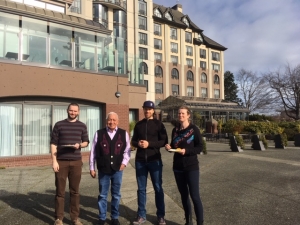Resources
Here are key Resources (reports, videos, and links) created by the Living Lab Project and by our partners for you to use. Please send your suggestions for other resources, and check out our partners’ websites below.
Living Lab
Living Lab Insect Guide (2025)
Living Lab Plant & Marine Guides (2021)
Living Lab Brochure (22 March 2020)
Living Lab Resource Inventory (2022)
ȾIKEL: A W̱SÁNEĆ Restoration Project (2018-2021)
Songhees Youth Trip Report (2019)
Songhees Living Science Lab Report (2019)
Songhees Living Science Lab Report (2018)
Lekwungen Reference List (2019)
Other
Challenging Racist “British Columbia”: 150 Years and Counting – “150 Years and Counting (150YC) is a new open-access, multi-media resource that documents how this recent cycle of anti-racist activism is part of a broader history of Indigenous, Black and other racialized communities challenging white supremacy for over 150 years – particularly since 1871 when BC joined Canada.”
Open Science Beyond Open Access: For and with communities: A step towards the decolonization of knowledge – July 2020 article prepared for the Canadian Commission for UNESCO by Leslie Chan, Budd Hall, Florence Piron, Rajesh Tandon and Lorna Williams
Whose Land is it? – Feb 2020 BC Studies article by John Price and Nick Claxton
Partner Links / Resources
Office of Indigenous Academic and Community Engagement (UVic) Website
World Fisheries Trust Website
PEPÁḴEṈ HÁUTW̱ Foundation Website
W̱SÁNEĆ School Board Website
Songhees Nation Website
NSERC Website
FNESC Story
FNESC and Science Education – On February 26, Living Lab staff and partners attended the Science Education workshop held by FNESC – the First Nations Education Steering Ctte. which is the umbrella group for First Nations led education in BC.
FNESC staff led workshop participants, mainly school teachers, TAs and counsellors through the new Science Curriculum focused on Grades 5-9. http://www.fnesc.ca/science-f
The First Nations Education Steering Committee (FNESC) http://www.fnesc.ca/about-fnes

Left to right – Matthew Stewart( Science Venture), Frank ( Bangus) George, Tensley Koontz ( Esquimalt High School Indigenous Counsellor, Sonya McRae, Shoreline School Art Teacher, Big Canoe Program Coordinator
Note: The group are standing at the location of the site of Chief Cheetlum’s ( Chekonein family) long house – Bangus’ great grandfather whose Cadboro Bay long house was moved to the Inner Harbour in the 1840’s.
First People’s Principles of Learning – http://www.fnesc.ca/wp/wp-